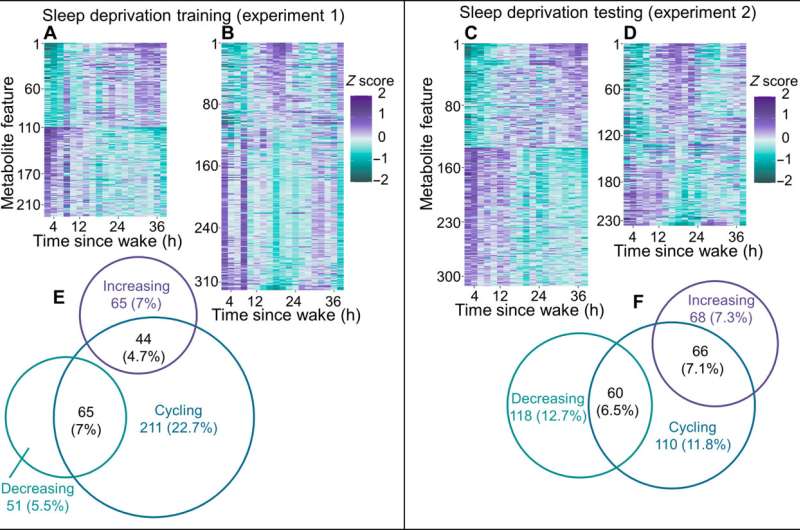This article has been reviewed according to Science X's editorial process and policies. Editors have highlighted the following attributes while ensuring the content's credibility:
fact-checked
peer-reviewed publication
trusted source
proofread
Blood-based marker developed to identify sleep deprivation

A blood test that can accurately detect when someone has not slept for 24 hours has been developed by experts at Monash University, in Australia, and the University of Birmingham, in the UK.
This level of sleep deprivation increases the risk of serious injury or fatality in safety critical situations.
Published in Science Advances, the biomarker used a combination of markers found in the blood of healthy volunteers. Together, these markers accurately predicted when the study volunteers had been awake for more than 24 hours under controlled laboratory conditions.
The biomarker detected whether individuals had been awake for 24 hours with a 99.2 percent probability of being correct, when compared to their own well-rested sample. When a single sample was considered without the well-rested comparison (similar to a diagnostic blood test), it dropped to 89.1 percent, which was still very high.
With about 20 percent of road accidents worldwide caused by sleep deprivation, researchers hope the discovery may inform future tests to quickly and simply identify sleep deprived drivers. The biomarker could also be developed for other situations where sleep deprivation may lead to catastrophic consequences, such as in safety-critical workplaces.
Senior author Professor Clare Anderson led the research while she was with the Monash University School of Psychological Sciences and Turner Institute for Brain and Mental Health. She is now Professor of Sleep and Circadian Science at the University of Birmingham in the UK.
"This is a really exciting discovery for sleep scientists, and could be transformative to the future management of health and safety relating to insufficient sleep," Professor Anderson said. "While more work is required, this is a promising first step.
"There is strong evidence that less than five hours' sleep is associated with unsafe driving, but driving after 24 hours awake, which is what we detected here, would be at least comparable to more than double the Australian legal limit of alcohol performance wise."
The test may be also ideal for future forensic use but further validation is required.
First author Dr. Katy Jeppe, from the Monash Proteomics and Metabolomics Platform, previously from the School of Psychological Sciences, said it was difficult to say how soon the test could be developed for post-accident use.
"Next steps would be to test it in a less controlled environment and maybe under forensic conditions, particularly if it was to be used as evidence for crashes involving drivers falling asleep," Dr. Jeppe said.
"Given it's blood, the test is more limited in a roadside context, but future work could examine whether our metabolites, and therefore the biomarker, are evident in saliva or breath."
This sleep deprivation biomarker is based on 24 hours or more awake, but can detect down to 18 hours awake. A biomarker for limited sleep over the previous night could be developed but more research is required to combine the time since sleep with the amount of sleep in the predictions.
"Much further work would be needed if laws were to change and a sleep deprivation test introduced on the road or in workplaces," Dr. Jeppe said. "This would include further validation of biomarkers, as well as establishing safe levels of sleep to prevent and recover from impairment, not to mention the extensive legal process."
"A biomarker for limited sleep over the previous night could be developed, and others have made progress in this respect (Depner et al.)."
Sleep deprivation can have fatal consequences for other safety-critical occupations. Major catastrophes including the Chernobyl nuclear reactor meltdown and the Challenger space shuttle Disaster* are thought to be caused, in part, by human error associated with fatigue.
"Objective tests that identify individuals who present as a risk to themselves or others are urgently needed in situations where the cost of a mistake is fatal," Professor Anderson said.
"Alcohol testing was a game changer for reducing road crashes and associated serious injuries and fatalities, and it is possible that we can achieve the same with fatigue. But much work is still required to meet this goal."
More information: Katherine Jeppe et al, Accurate detection of acute sleep deprivation using a metabolomic biomarker—A machine learning approach, Science Advances (2024). DOI: 10.1126/sciadv.adj6834



















